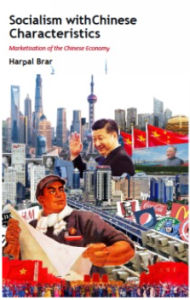 I wish to congratulate Comrade Harpal Brar on his most recent work Socialism with Chinese Characteristics. This work has been long overdue in the international Communist movement, and Comrade Harpal has rendered invaluable assistance and clarification to this most contentious issue.
I wish to congratulate Comrade Harpal Brar on his most recent work Socialism with Chinese Characteristics. This work has been long overdue in the international Communist movement, and Comrade Harpal has rendered invaluable assistance and clarification to this most contentious issue.
As Comrade Harpal expresses in the preface of his book, the issue of “market socialism” in China has been a most sensitive subject for communists for some time. I think all of us have been guilty of neglecting this critical issue out of fear of being seen as criticising the People’s Republic of China and being un-Marxist. But, to the contrary, our silence has been the greatest disservice to Marxism-Leninism, and brings to mind the attitude towards the Soviet Union post-1956 and the rise of Khrushchevite revisionism when the majority of communists stood mute as socialism was betrayed. Once again, Comrade Harpal and the CPGB-ML has taken the initiative and courage to stand up and defend the fundamentals of Marxist-Leninist science.
In the world communist struggle today, no other issue has caused more harm and confusion than the relation of the market and commodity production to socialist society. It is sad to see so many who profess to be communist/Marxist-Leninist vigorously defending the non-Marxist concept of “market socialism”. Most of them without even realising are in fact arguing for the defence of capitalism by stressing that no new socialist society can be built without a strong market, which essentially is saying, as any proud bourgeois apologist would, that a society that does away with the market/commodity production is doomed to inefficiency and failure. A greater refutation of Marxism-Leninism would be harder to find. And this from so-called communists! And the greatest source of this erroneous theory is China and the heralded “success” of “market socialism”.
The example of China has led to mass confusion of so many in the communist world, who now believe that only through the market can socialism be built. But I also believe this highlights a problem that has plagued the international communist movement for many years, and that is the near-total absence of any works or teachings on the political economy of both capitalist and socialist society, especially of the latter. In this regard, Comrade Harpal’s work has taken a major step forward. Until a deeper understanding of bourgeois and socialist political economy occurs, non-Marxist theories will not only go unchallenged, but be embraced by many communists, and that can only lead to terrible setbacks on the road to Communism. For myself as a young communist, it was reading Comrade Harpal’s chapter entitled The Economics of the Class Struggle Under Socialism in his incredible book Perestroika: The Complete Collapse of Revisionism that opened my eyes to this critical understanding. I see this latest book as an extension of that work.
Comrade Harpal’s book also shatters the myth that pre-“reforms” China, I.e. before 1978, was somehow backward and seriously disadvantaged by the lack of a strong market. Comrade Harpal illustrates that under Comrade Mao’s leadership, the Chinese people made enormous strides forward from the colonial/feudal/capitalist oppression they sweltered under before the liberation of 1949. That the advances of China today came about from socialist construction pre-“reforms”, and that all the inequalities of Chinese society today stem from the expansion of the market. I also concur completely with Comrade Harpal’s view that, if the Chinese comrades had maintained strong, socialist planning, the benefits to the Chinese people would have been even more than we see today.
I urge every communist and class-conscious worker to read this book, grasp it, and continue studying the Marxist-Leninist science of how the proletariat can build a socialist society and advance to Communism. And the march to the classless Communist society cannot be accomplished while the market gains strength. Comrade Harpal’s writings will contribute to this understanding.
Fraternally Yours
Mark Window
Adelaide, South Australia
Comments are closed, but trackbacks and pingbacks are open.